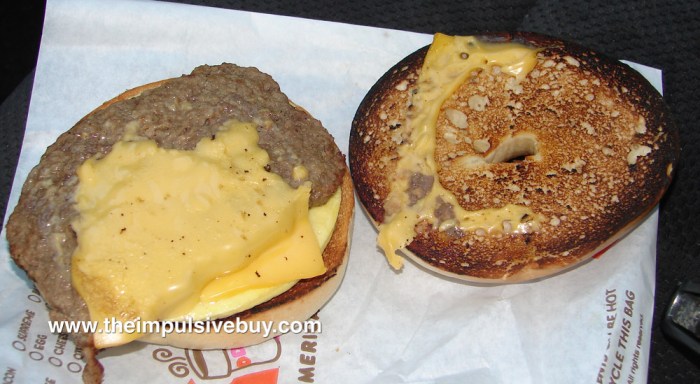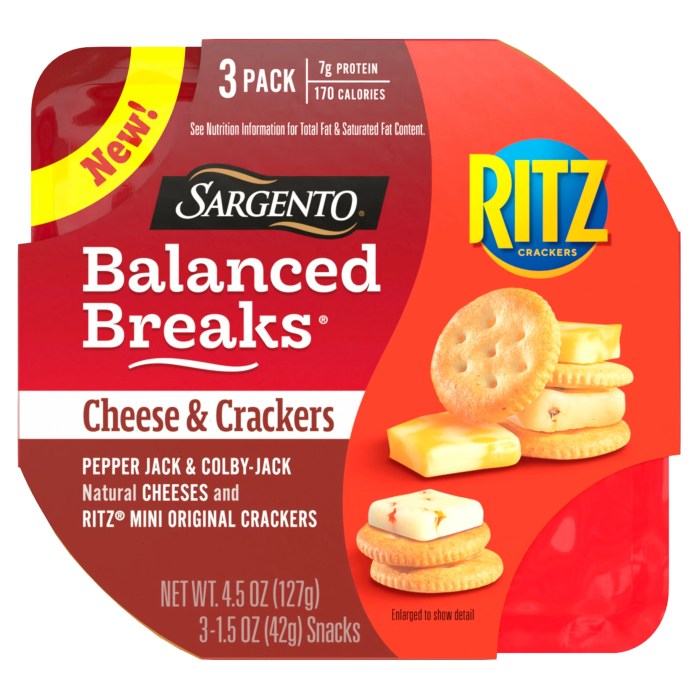Ingredient Analysis

Bacon egg cheese bagel dunkin donuts nutrition – Unlocking the nutritional secrets within Dunkin’ Donuts’ Bacon, Egg & Cheese Bagel reveals a fascinating interplay of ingredients. Understanding the individual components – the bagel itself, the crispy bacon, the fluffy egg, and the melty cheese – allows us to appreciate the complete nutritional picture and make informed choices. This analysis delves into the specifics, highlighting the impact of ingredient variations and potential allergens.
Let’s embark on a journey to dissect the nutritional landscape of this beloved breakfast sandwich.
Nutritional Comparison of Components, Bacon egg cheese bagel dunkin donuts nutrition
A comprehensive understanding requires comparing the nutritional contributions of each ingredient. The following bullet points offer a simplified comparison, acknowledging that precise values can vary based on specific product variations and preparation methods. Remember to always check the official Dunkin’ Donuts nutritional information for the most up-to-date details.
- Bagel: Provides the base carbohydrates, offering energy but potentially high in refined carbohydrates depending on the type (white vs. whole wheat). May also contain fiber, depending on the type of bagel.
- Bacon: A significant source of fat and protein, also contributing sodium. The level of saturated fat is noteworthy.
- Egg: A good source of protein and essential nutrients like choline. The cholesterol content should be considered.
- Cheese: Primarily a source of fat and protein, with varying levels of sodium and saturated fat depending on the type of cheese used (e.g., cheddar, American).
Impact of Bagel Type
The choice of bagel significantly impacts the overall nutritional profile. This is primarily due to the differences in carbohydrate composition and fiber content.
- Whole Wheat Bagels: Offer a higher fiber content, promoting digestive health and contributing to a feeling of fullness. The fiber also helps regulate blood sugar levels more effectively than refined carbohydrates.
- White Bagels: Primarily provide refined carbohydrates, which are digested quickly and can lead to blood sugar spikes. They generally contain less fiber than whole wheat bagels.
Potential Allergens
Awareness of potential allergens is crucial for those with sensitivities or allergies. The Bacon, Egg & Cheese Bagel contains several common allergens.
Considering the nutritional content of a Dunkin’ Donuts bacon, egg, and cheese bagel, you might be looking for lighter alternatives. For a lower-fat cheese option, you could explore the nutritional profile of ricotta cheese, readily available information on which can be found here: ricotta cheese nutrition info. Comparing this to the bagel’s nutritional information can help you make informed choices about your breakfast.
- Gluten: Present in the bagel, making it unsuitable for individuals with celiac disease or gluten intolerance.
- Dairy: The cheese is a dairy product, posing a risk for those with lactose intolerance or dairy allergies.
- Eggs: An obvious allergen for individuals with egg allergies.
- Soy: Some bacon processing may involve soy ingredients, so this is a potential allergen to be aware of.
Nutritional Comparison to Similar Breakfast Items

Embarking on a journey to understand the nutritional landscape of our Dunkin’ Donuts Bacon, Egg & Cheese Bagel requires a broader perspective. Comparing it to similar breakfast offerings from other fast-food establishments reveals valuable insights into its place within the spectrum of convenient breakfast choices. This comparison allows us to make informed decisions about our dietary choices, empowering us to fuel our bodies effectively.A direct comparison highlights the variations in caloric content and fat composition among seemingly similar breakfast sandwiches.
Understanding these differences is crucial for mindful eating.
Calorie and Fat Content Comparison
| Restaurant | Item | Calories | Total Fat (g) |
|---|---|---|---|
| Dunkin’ | Bacon, Egg & Cheese Bagel | ~500 | ~25 |
| McDonald’s | Bacon, Egg & Cheese McGriddle | ~400 | ~20 |
| Starbucks | Bacon, Gouda & Egg Sandwich on Artisan Roll | ~450 | ~22 |
| Subway | Bacon, Egg & Cheese on a Hearty Multigrain Flatbread | ~420 | ~18 |
Note
Calorie and fat content can vary slightly depending on preparation and specific ingredients. These figures represent approximate averages.*
Healthier Alternatives with Comparable Protein and Fiber
The Dunkin’ Donuts Bacon, Egg & Cheese Bagel, while undeniably delicious, may not be the pinnacle of nutritional excellence. However, we can find healthier alternatives that offer similar protein and fiber content, crucial for sustained energy and satiety. By focusing on whole grains, lean protein sources, and nutrient-rich additions, we can create breakfast options that nourish our bodies while satisfying our cravings.Exploring alternatives allows for a balanced approach to nutrition, ensuring we obtain essential nutrients without compromising taste.
Sodium Content Comparison
High sodium intake can negatively impact health. Therefore, comparing the sodium content across different breakfast sandwiches is essential for making informed choices.
| Restaurant | Item | Sodium (mg) |
|---|---|---|
| Dunkin’ | Bacon, Egg & Cheese Bagel | ~1000 |
| McDonald’s | Bacon, Egg & Cheese McGriddle | ~800 |
| Starbucks | Bacon, Gouda & Egg Sandwich on Artisan Roll | ~900 |
| Subway | Bacon, Egg & Cheese on a Hearty Multigrain Flatbread | ~750 |
Note
Sodium content can vary slightly depending on preparation and specific ingredients. These figures represent approximate averages.*
General Inquiries: Bacon Egg Cheese Bagel Dunkin Donuts Nutrition
What are the potential long-term health effects of eating this bagel regularly?
Regular consumption could contribute to weight gain, elevated cholesterol levels, and increased risk of heart disease due to high saturated fat and sodium content. Blood sugar spikes are also possible.
Are there vegetarian or vegan alternatives to this sandwich at Dunkin’?
Dunkin’ offers various breakfast sandwiches with plant-based sausage or veggie options, though nutritional profiles will vary.
How does the nutritional content compare to a homemade version?
Homemade versions often allow for greater control over ingredients, potentially reducing fat, sodium, and calories, depending on the recipe.
What are the best ways to incorporate this into a balanced diet?
Consume sparingly, pair with a substantial portion of fruits and vegetables, and choose a healthier bagel type (e.g., whole wheat) when possible.


